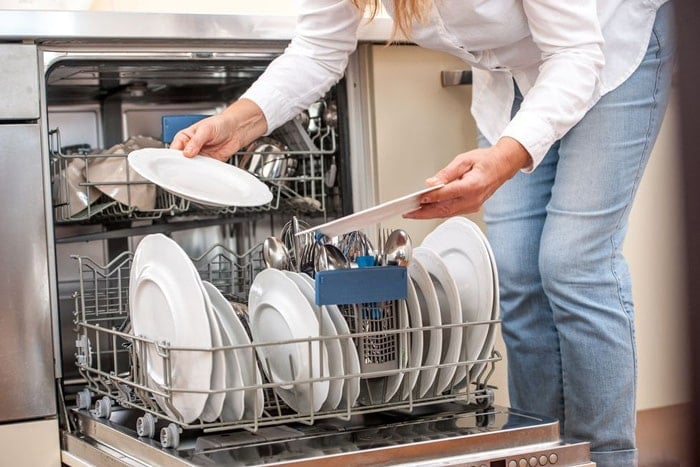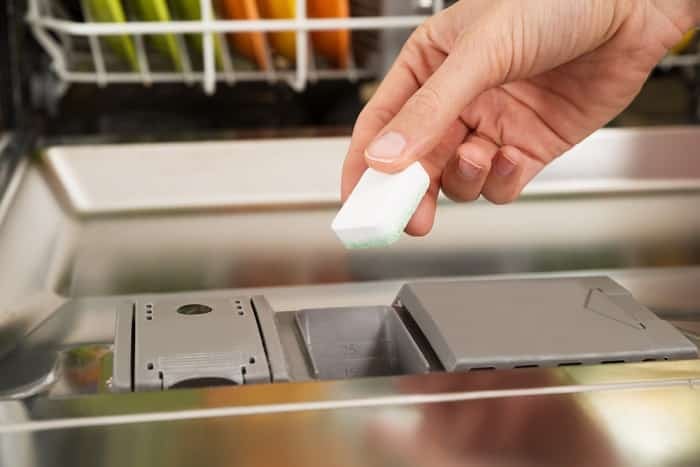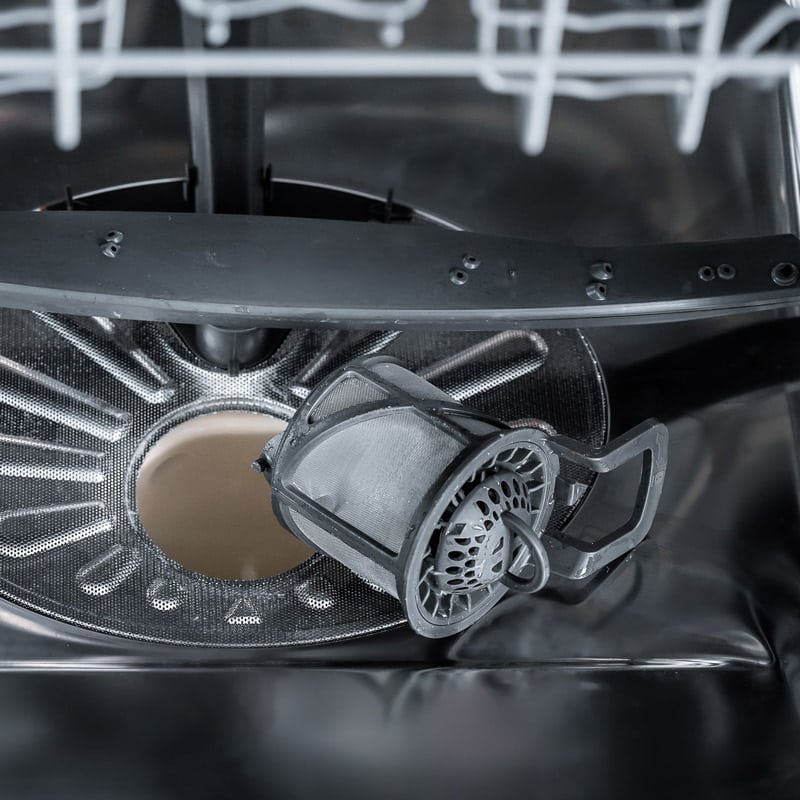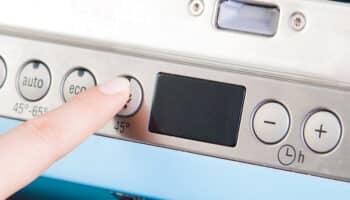Are your glasses coming out cloudy from the dishwasher?
You’re not alone! I understand how annoying it can be to open your dishwasher only to find cloudy glasses.
Don’t worry, though. You’ve come to the right place to solve the issue.
To fix cloudy glasses from a dishwasher, you’ll need to load the unit correctly and use a water softener, rinse aid, and the right type and amount of detergent. It’s also important to check the water temperature and clean the filter.
Read on to get crystal-clear glasses again!
Preventing Cloudy Glasses From the Dishwasher: 6 Steps
In this section, I’ll walk you through the different solutions you can try to keep your dishwasher from leaving cloudy glasses.
Are you ready? Let’s get started!
#1 Load Your Dishwasher Correctly
If your glasses are cloudy, ensure you’re loading your dishwasher correctly.
Dishwashers have spray arms that rotate to distribute water and detergent onto your dishes. Unfortunately, if you load your dishwasher incorrectly, you can block the spray arms. As a result, certain parts of your dishes will not get properly cleaned and rinsed, leading to a cloudy appearance.

When loading your dishwasher, make sure the spray arms can move freely and leave enough space between your dishes to ensure water and detergent can reach all surfaces.
I also recommend placing your glasses at an angle facing downward to allow water to drain properly.
#2 Use a Water Softener
In my experience, cloudy glasses from a dishwasher are usually caused by hard water.
Hard water contains a high concentration of calcium and magnesium, which can lead to limescale buildup and cloudy glassware.
To determine if you have hard water, simply look for limescale buildup on faucets or showerheads. You can also buy a water test kit at any home improvement store. These kits contain a strip that changes color based on the hardness of water.
Some modern dishwashers come equipped with a water softener. If yours doesn’t have one, don’t worry! If you live in an area with hard water, you can prevent cloudy glasses by adding two teaspoons of table salt to the soap dispenser.
Alternatively, you can also fill a dishwasher-safe bowl with vinegar and place it on the top rack. Vinegar contains acetic acid, which can break down mineral deposits.
#3 Use Rinse Aid
In my opinion, one of the easiest ways to prevent cloudy glasses from your dishwasher is by using a rinse aid.
Rinse aid lowers the surface tension of water so droplets can slide off more easily, preventing spots from forming on glasses. It also helps in the drying cycle.
You can find rinse aid in almost every supermarket or online store; it usually costs between $5 and $15. To use it, simply remove the small cap covering the rinse aid compartment and fill it up to the max level.
Note: Keep in mind that it’s important to read the manufacturer’s manual, as it typically includes recommendations for the type of rinse aid to use.
#4 Use the Right Detergent
If you’re still struggling with cloudy glasses, I recommend checking the detergent.
Using the wrong type or amount of detergent can prevent the breakdown of food debris or mineral buildup. Additionally, using too much or too little detergent can result in residue and a filmy appearance on your glasses.

When it comes to dishwasher detergent, there are different types available, including liquid, powder, tablets, and pods. Consider reading the manufacturer’s manual to ensure you’re using the right type and amount of detergent.
It is important to note that if you’re dealing with hard water, you’ll need to use a bit more detergent or products specifically formulated for hard water.
#5 Check the Water Temperature
When dealing with cloudy glasses, I usually advise checking the dishwasher’s water temperature.
You see, most detergents are designed to dissolve at specific temperatures. If your dishwasher uses cold water, the detergent will not dissolve properly, resulting in dirty dishes. On the other hand, if the water temperature is too high, it can lead to etching and make the glasses appear cloudy.
To check your dishwasher’s water temperature, please turn on the hot water tap, fill a glass with water, and insert a candy thermometer. Most detergent manufacturers recommend a temperature of 130-140 ºF for the best cleaning results.
However, if you notice that your dishwasher isn’t using hot water, consider testing the heating element with a multimeter.
A functioning heating element will typically show a reading between 6 and 12 ohms or as the manufacturer recommends. If the multimeter shows a different reading, consider getting a replacement.
#6 Clean the Filter
It’s also important to regularly clean your dishwasher’s filter to prevent cloudy glasses.
You see, the filter is responsible for trapping food and other debris to prevent them from being re-circulated onto your dishes. Unfortunately, a dirty filter can lead to a gritty or cloudy residue on your glasses.

But don’t worry. Cleaning the filter is very simple; you’ll just need to:
- Locate the filter, which is typically at the bottom of the dishwasher.
- Remove the necessary racks to access the filter. Then, turn it counterclockwise and pull it up gently.
- Scrub the filter with a wire brush and rinse it with hot water. Avoid using abrasive cleaners to prevent damaging the filter.
- Clean the filter housing with a microfiber cloth and a soft sponge.
- Place the filter back into its housing and start a dishwasher cycle.
Still Stuck With Cloudy Glasses?
If you’ve tried all of the fixes mentioned in this article, but your glasses are still coming out of the dishwasher looking cloudy, it’s likely that you’re dealing with an etching issue.
Etching occurs when scratches form on the surface of the glass due to factors like soft water, harsh detergents, or excessive heat. Unfortunately, once the glass is etched, the damage is irreversible. So, it’s crucial to follow the recommendations above.
It’s important to mention that etched glasses are perfectly safe to use for drinking. You should only replace them if the cloudy appearance bothers you.
Wrapping Up: Getting Crystal Clear Glasses
That about covers it! Hopefully, now you know how to fix cloudy glasses from your dishwasher.
Remember to make sure you’re using the right type and amount of detergent and rinse aid. It’s also important to load the unit correctly, use the right water temperature, and add salt to the soap dispenser for hard water issues.
Thank you so much for taking the time to read this article. If you’ve found it helpful, please check out our other related posts below.
Have a great rest of the day!









